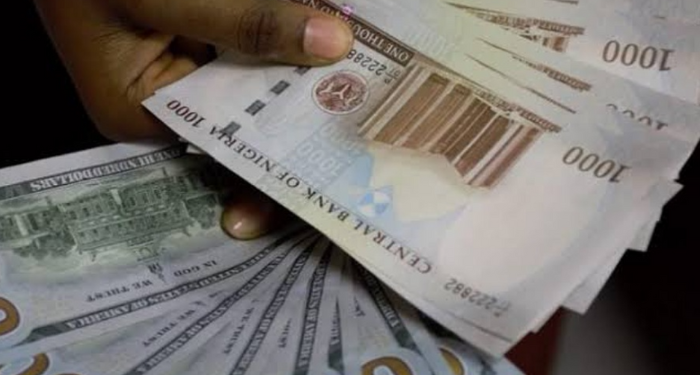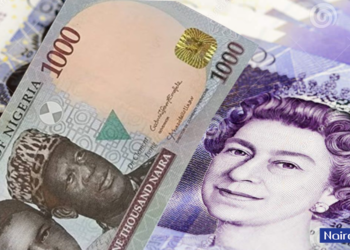The Naira has lost about 68% of its value, marking a profound downturn since the implementation of the foreign exchange unification policy, according to data from Nairalytics.
In January 2024, the official foreign exchange rate surged to N1455.59/$, marking a significant depreciation from the previous rate of N464.67/$ in May 2023.
The situation in the parallel, or unofficial, market is equally grim, showcasing a descent from N763/$ to N1470/$ in the same timeframe, translating to a harrowing 48% devaluation.
This economic tremor is further underscored by the dip in Nigeria’s external reserves, which have dwindled from $35.09 billion to $33.35 billion over these months. It is projected that Nigeria’s foreign reserve will further drop to $24 billion this year.
More Insights
- In a bold move in June 2023, the Central Bank of Nigeria (CBN) unveiled a strategy to streamline the foreign exchange market by merging all segments into a single unified system. This pivotal shift, aimed at fostering liquidity and stability within the Nigerian Foreign Exchange (FX) Market, ironically seems to have precipitated increased market volatility and a precipitous decline in the Naira’s value.
- The escalated demand for foreign currency is believed to have exacerbated the Naira’s depreciation. A pervasive rush among Nigerians to secure dollars for critical outlays, such as educational fees, healthcare, and importation costs, continues to pressure the local currency.
- Several critical factors compound the issue, including a considerable flow of foreign currency from non-oil avenues like remittances, tourism, and non-oil exports, predominantly channelled through the informal market. Nigeria’s inability to fulfil its OPEC oil production quota significantly influences the Naira’s valuation, given the pivotal role of oil in the nation’s foreign exchange earnings. The situation is further aggravated by rampant oil theft, culminating in diminished oil revenue.
- The weakening Naira has inflicted broad economic repercussions, including heightened import costs, surging inflation rates, diminishing purchasing power, and a deterrent effect on investment inflows. The inflationary trend peaked at 28.92% by December 2023, as reported by the National Bureau of Statistics (NBS), underscoring the inflationary pressures beleaguering the economy.
- The fate of the Naira is intricately linked to a constellation of determinants, encompassing the country’s monetary and fiscal policy frameworks, political and security stability, and the global community’s confidence in Nigeria’s economic landscape.
- Nigeria currently struggles significant challenges with foreign exchange illiquidity, impacting the country’s ability to clear its forex backlog and further depreciating the Nigerian currency’s value. This forex scarcity has been a major hurdle in meeting the nation’s foreign exchange obligations, contributing to a dwindling confidence among foreign investors.
- In response to these challenges, the Central Bank of Nigeria (CBN) has taken some steps, such as addressing the backlog of foreign exchange forwards, with an outstanding balance of $2.2 billion yet to be cleared.
- Looking ahead, the CBN’s commitment to enacting reforms is anticipated to be a linchpin in bolstering the Naira’s standing against the dollar, highlighting the critical intersection of policy efficacy and economic resilience.












.gif)







Despite all this measures, the CBN governor and his aids are not willing to deals with the current Naira collapsed, the key measures like injecting the dollar to a corrupt system is an indication of system decay, because it has no significance
From the my view there are one way out of many , those idea that CBN afraid of, converting every demociliary account in to Naira ,then decide the official rate for US dollar, be rest assure no one ever to hoard a dollar to his account, unless on purposes such as education, medical tours and the like. May Niheria and Nigerian Succeed.
Despite all this measures, the CBN governor and his aids are not willing to deals with the current Naira collapsed, the key measures like injecting the dollar to a corrupt system is an indication of system decay, because it has no significance
From the my view there are one way out of many , those idea that CBN afraid of, converting every demociliary account in to Naira ,then decide the official rate for US dollar, be rest assure no one ever to hoard a dollar to his account, unless on purposes such as education, medical tours and the like. May Nigeria and Nigerian Succeed.
Your percentage computation from the data you posted is very very wrong.
N763/1$ to N1470/1$ is a 92.7% depreciation.
Also, N464.67 to N1455.59 for official rate is a 213.3% depreciation.
I’m sure if naira depreciation percentage is what you posted, the whole country won’t be shouting like this. When I saw your headline, I know there was trouble. Please only put correct information out there as your site is one of the few trusted and most read business news site in the country.
A descent from N763/$ to N1470/$ translates to a harrowing 93% devaluation, not 48%. Moreover, Naira has definitely lost more than 68% of its value in the official market since FX unification policy. It’s ~213% if we take into consideration your estimated January 2024 rate of N1455.59/$, as against the N464.67/$ in May 2023.
At this critical time in our nation, this kind of information is very important. Let’s recheck our computation to ensure we do not put out any misleading information to the public.